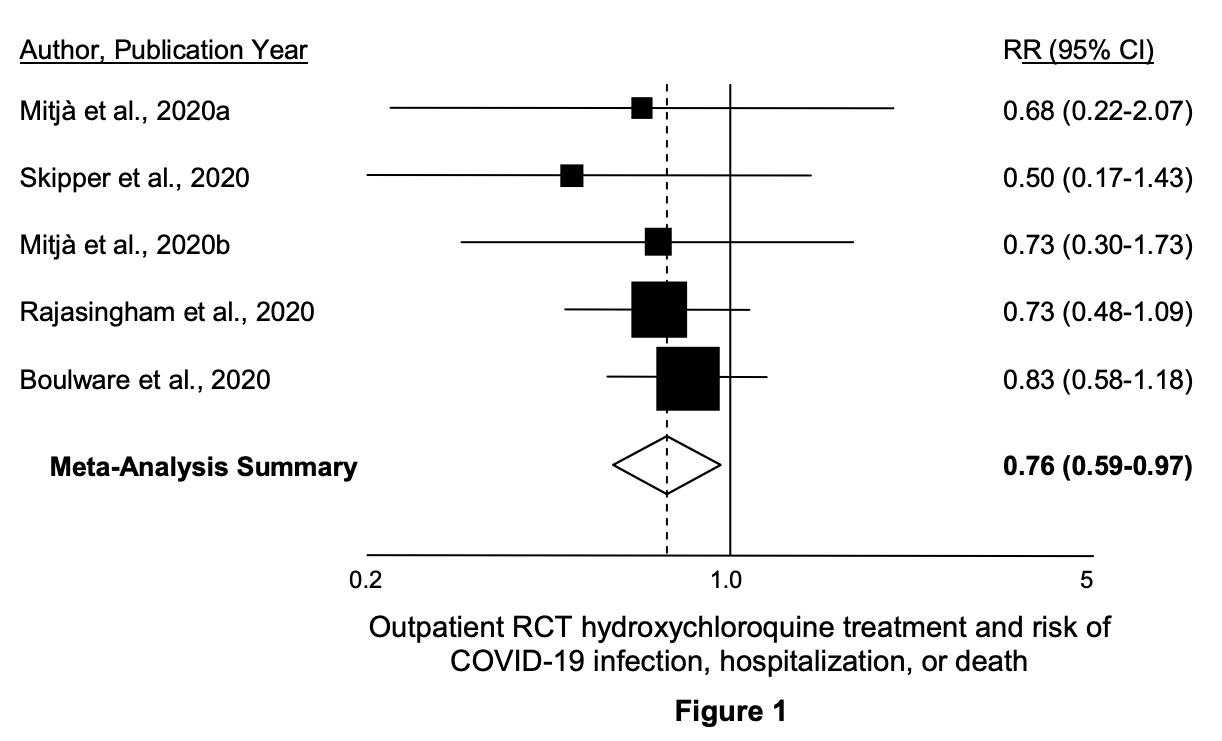In any normal year, an academic debate about the efficacy of a certain drug to treat an infection would never garner media attention. But this isn't a normal year.
For mostly political reasons and despite a dearth of evidence, the drug hydroxychloroquine (HCQ) is widely believed to be useful in the fight against the coronavirus. Some additional buzz was generated recently when a pre-print journal article claimed that a meta-analysis of previous clinical trials showed that HCQ could help reduce COVID-19 infection, hospitalization, and death.
 But there is at least one major shortcoming with the analysis, as pointed out by my colleague Dr. Chuck Dinerstein in an internal ACSH discussion: None of the studies that the authors cited reached statistical significance on their own. (See figure. Each of the individual studies yielded a confidence interval that included 1.0, which means the results are not statistically significant.) Only after combining different studies could the researchers claim statistical significance. That is iffy, at best.
But there is at least one major shortcoming with the analysis, as pointed out by my colleague Dr. Chuck Dinerstein in an internal ACSH discussion: None of the studies that the authors cited reached statistical significance on their own. (See figure. Each of the individual studies yielded a confidence interval that included 1.0, which means the results are not statistically significant.) Only after combining different studies could the researchers claim statistical significance. That is iffy, at best.
My colleague Dr. Josh Bloom has also explained in several articles why HCQ doesn't work for COVID-19. Way back in March, Dr. Bloom (who was an antiviral research chemist in a previous life, as well as a classical pianist) threw a cold, wet blanket on HCQ, which he concluded was unlikely to have the potency to be an effective antiviral drug. Therefore, he wasn't surprised when the FDA revoked its emergency use authorization. Likewise, he wasn't surprised when a pro-HCQ study was later found to suffer from serious methodological problems.
From Bad to Worse
Unfortunately, the news for HCQ enthusiasts keeps getting worse. A study just published in the New England Journal of Medicine enrolled 4,716 COVID patients in a trial, with 3,155 receiving standard treatment and the other 1,561 receiving HCQ. The primary aim of the experiment was to determine if there were fewer deaths within 28 days among those receiving HCQ.
How did the HCQ group do? Well, the result speaks for itself: "Patients in the hydroxychloroquine group had a longer duration of hospitalization than those in the usual-care group... and a lower probability of discharge alive within 28 days." That's bad. This really should put the hydroxychloroquine debate to bed. RIP HCQ.




